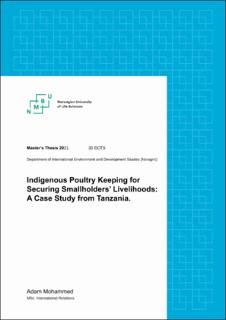| dc.description.abstract | There is a high demand for indigenous chicken in Tanzania because of the widely held belief that indigenous chicken is healthier than exotic chicken. Even when they are sick, they are given medicine even a few days before being slaughtered for the market. Because of this perception in Tanzania, the potential for the indigenous poultry industry remains largely untapped. s
Since 1989, Kilimanjaro and the other regions have been facing significant risks from climate change, with a rise in mean temperature, a decrease in annual precipitation, and the rainfall pattern increasingly becoming unimodal. The people in these regions face the risk of a decline in crop production and its associated negative consequences. Therefore, a coping strategy is needed to mitigate climate change for the people in these regions. The chosen coping strategy should meet the following criteria: it must not require massive capital so that everybody in the regions can get onboard. It must be simple, immune from the risk of climate change, and must not necessarily be new. I chose indigenous poultry keeping as a coping strategy because it meets the criteria and the huge demand for indigenous chicken in Tanzania.
The quantitative and qualitative data was used, collected by Norwegian Church Aid (NCA) staff, to test the possibility of introducing indigenous poultry keeping as a business to the people in Morogoro, Kilimanjaro, and Manyara regions Hai, Kilosa, Moshi rural and Babati rural districts. These districts are referred to as the study community in this research. From the whole study, 30 participants were screened that were involved in indigenous poultry keeping. The results showed that indigenous poultry keeping led to a positive impact on house construction and maintenance, assets, education, and the health of poultry keepers. The findings of this study were compared with other studies from Ghana, and it was revealed that the Tanzanian local poultry industry is better than that of Ghana. The reason for drawing this conclusion is that, unlike Tanzania, Ghanaian poultry farmers have been battling with their government through demonstrations and in the law courts to ban the importation of chicken products into Ghana, but the farmers have not succeeded on that cause. Also, chicken consumers in Tanzania of all walks of life patronize indigenous chicken irrespective of the season, whether processed or not, but in Ghana, the only period when demand for indigenous chicken goes up is during important religious festivals such as Easter and Christmas. Lastly, whilst broiler production is very profitable in Tanzania, broiler production has collapsed in Ghana due to a lack of market for local chicken making poultry farmers concentrate on egg production.
The study recommended the following measures to boost the local poultry industry in Tanzania further: the poultry farmers must have health insurance, access to loans, reduction of interest rate on loans, formation of the co-operative union, free veterinary services, and community sensitization about the prospects of indigenous poultry business. | en_US |

